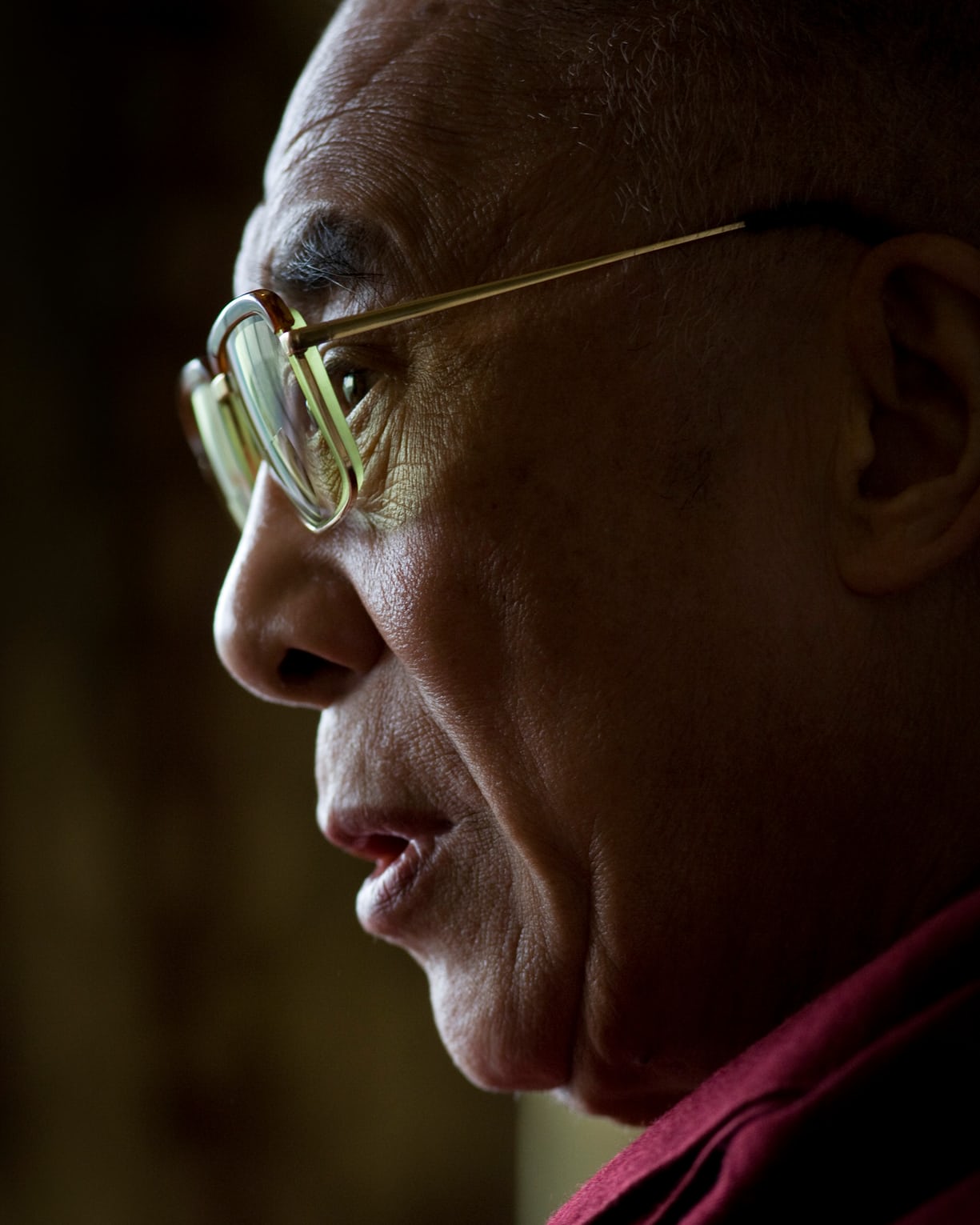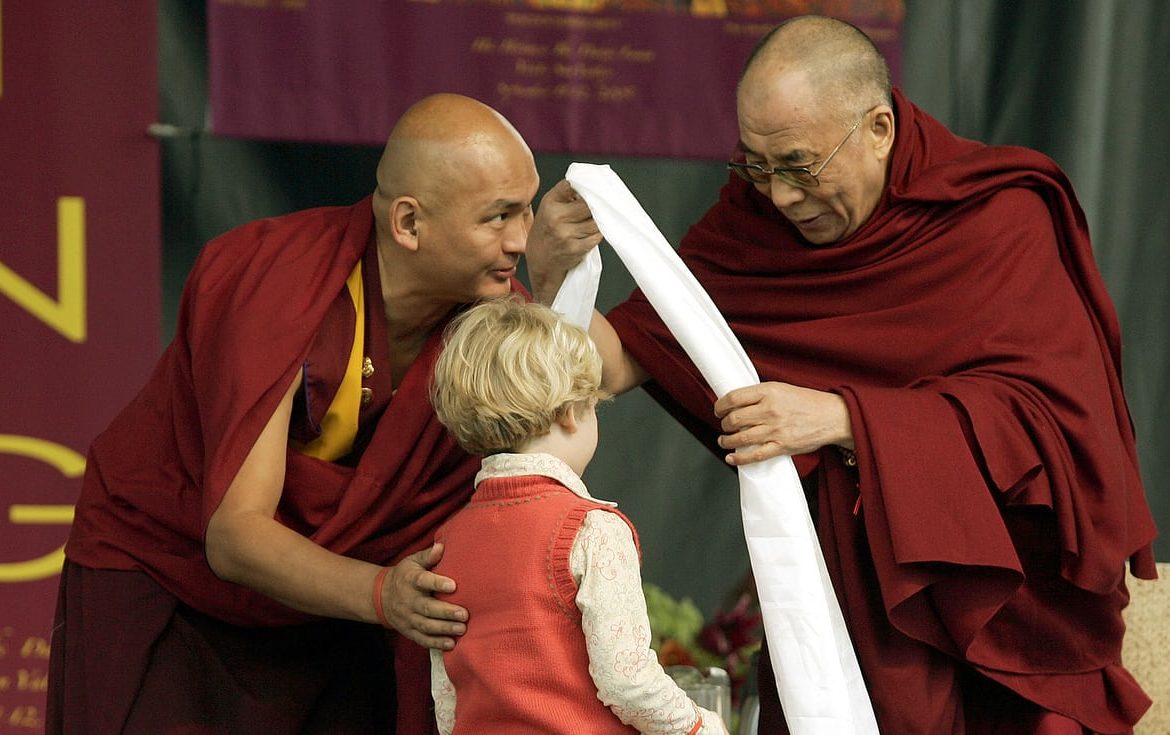This material belongs to: The Guardian.
Tibetan monk who is gatekeeper to the Dalai Lama in the US strongly denies allegations he demanded improper payments.
For more than 15 years, Tenzin Dhonden has stood between the Dalai Lama and multitudes of US philanthropists, celebrities, scholars and officials eager for even an instant in the revered Buddhist leader’s presence. In his red and saffron robes and gleaming bald pate, the smiling Tibetan monk, widely known as Lama Tenzin, has introduced himself as the Dalai Lama’s “personal emissary for peace”.
Yet the monk has now been suspended as secretary and trustee of the Dalai Lama Trust, a charitable organization chaired by the Dalai Lama, pending an investigation into allegations from a prominent Seattle-based technology entrepreneur who claims that, between 2005 and 2008, the monk abused his role to extract unjustified payments from him.
The Dalai Lama is said to have expressed “deep disappointment and concern” over complaints about his gatekeeper, which include the allegation he demanded payments in return for ensuring the spiritual leader appear at a major event in Washington state.

Dhonden, 53, strongly disputes the allegations. In a move that shows how seriously he regards the potential impact of the claims against him, the quiet monk, who is respected in Dharamsala, the hill town in India which hosts the exiled Tibetan spiritual leader, has contracted Patterson Belknap, a major New York City law firm to defend him.
Attorneys for the law firm said in an email that the allegations against their client relate to events that “occurred nearly a decade ago, are largely inaccurate and otherwise relate to conduct that is not unlawful, unethical, or even inappropriate”. They added in the email the allegations have been “designed to falsely and unfairly tarnish” Dhonden’s reputation. A source close to the monk said any payments he received were for legitimate work done and business expenses.
Those lawyers are now locked in a behind-the-scenes battle with Daniel Kranzler, the Seattle businessman and philanthropist who claims that for several years he felt pressured into making payments to the monk, including some he alleges were made in cash to avoid leaving a trace.
Kranzler first relayed his concerns to the Dalai Lama during a face-to-face meeting over the summer, according to two other people present at the meeting. He has also laid out his accusations to the Dalai Lama in two letters, both of which have been seen by the Guardian.
Dhonden was not present at his San Diego home, a ground-floor apartment in, during a visit this past weekend, and there is some suggestion he may be in India. The Dalai Lama Trust, which has a website that still lists Dhonden as its “venerable” secretary, has not responded to multiple requests for comment.
For more than two weeks, the Dalai Lama, and other figures close to the Buddhist leader, also held their silence, declining to respond to multiple requests for comment. However on Tuesday, the Dalai Lama’s personal secretary confirmed in an email that Dhonden has been suspended since 5 October, adding that the monk has been asked to respond to the allegations “in order to reach a conclusion” over the accusations.
It is a difficult predicament for Dhonden, whose star has been on the rise since 1991, when he arrived in the US and taught meditation and counseled terminally ill patients. In 2000, he founded a not-for-profit organisation called Friends of the Dalai Lama, based in La Jolla, California, near San Diego, which he still controls. Over time, Dhonden became the Dalai Lama’s de facto emissary, a position that led to frequent contact with some of the Buddhist leader’s many rich and well-connected supporters.
Many, but not all, relied on Dhonden for access to the Dalai Lama. “Everything I have to approve,” he told the San Diego Union Tribune in a 2015 interview. “There are many requests, demands coming to me.” The same article quoted admirers who praised Dhonden’s “equanimity” and “pure goodness”.
It is little surprise that Dhonden has, along the way, established connections with some of the Dalai Lama’s most high-profile US admirers – Kranzler said he introduced the monk to Steve Jobs, the singer Dave Matthews and other well-known artists and rich businesspeople interested in Buddhism. Dhonden may also have made enemies of some in the US over his ability to control access to the spiritual leader.
Concerns have recently been expressed by some other American Buddhists, for example, about the monk’s judgment following an 80th birthday celebration Dhonden organized for the Dalai Lama in California in 2015.
The event, held in Anaheim, south of Los Angeles, featured a giant golden cake, testimonials by minor celebrities and dancers in tight body suits who circled around the spiritual leader while a lotus flower-shaped contraption lowered other dancers from the ceiling.
Richard Grace, a Napa vineyard owner who has been friends with the Dalai Lama for more than 20 years, was in the audience, and was horrified. “How does anybody think that’s appropriate?” he said. “It was insulting.”
Grace, a former marine officer, blamed Dhonden.
Upon hearing friends and acquaintances also criticise the monk’s performance as emissary he resolved to alert the Dalai Lama – a task complicated, he said, by Dhonden loyalists in Dharamsala he claimed had insulated the spiritual leader from such complaints.
Grace contacted Marty Krasney, the director of Dalai Lama Fellows in San Francisco, who shared similar concerns.
The duo then enlisted Kranzler to join them at a meeting they arranged to convey their concerns to the Dalai Lama while he was speaking at the University of California in San Diego. The in-person meeting was, they believed, a rare chance to circumvent Dhonden’s influence over the spiritual leader’s information flow.

The meeting was scheduled for 10 minutes but ran more than an hour, according to those present.
Grace said the allegations of financial impropriety left the Dalai Lama “slack-jawed” with surprise – a description echoed by Krasney and Kranzler.
The most serious of those allegations relate to a large public event featuring the Dalai Lama that Kranzler’s charitable nonprofit, the Kirlin Foundation, organised in 2008 called Seeds of Compassion.
In Kranzler’s first letter to the Dalai Lama, which was sent in July, he said said it was only after his planners had reserved seats for 150,000 attendees and committed to several million dollars in expenses that Dhonden allegedly threatened to cancel the Dalai Lama’s trip unless he received additional payments.
Kranzler claimed the monk demanded “very substantial payment in various forms” for the event to go ahead, adding: “We had no choice not to give in to what we clearly saw as blackmail.”
The letter contained a breakdown of those alleged payments. Some were said to be documented in checks and bank deposits, while others, Kranzler alleged, cannot be traced because the monk “asked to be paid in cash to avoid records”. In all, Kranzler alleged in the letter, he paid Dhonden more than $250,000 in connection with the Seeds of Compassion visit. He further alleged it was only after the event ended and Dhonden asked him to buy him a $850,000 house to continue to arrange events with the Dalai Lama that “I said ‘enough is enough’”.
The source close to Dhonden said he had never owned a house of such value, and any payments he received were for legitimate work.
The San Diego meeting with the Dalai Lama, and ensuing letters detailing complaints about his emissary, were rare exceptions to convention around the Dalai Lama, said Robert Thurman, a Columbia University professor of Buddhist studies, who co-founded the Tibet House in New York and is one of the Dalai Lama’s closest US collaborators.
“It is considered a breach of etiquette to bring up unpleasant matters to the Dalai Lama,” Thurman said. That custom, he added, “leads to whistleblowers not being rewarded”. Thurman said the Dalai Lama never profits from conference talks or appearances, never even taking honorariums.
Ultimately, the Dalai Lama may now be required to decide whom he believes: his long-serving monk or a trio of American Buddhists now questioning his integrity. The case may also rest on the Dalai Lama’s interpretation of any documented payments to his emissary, and whether or not he believes they were justified.
A source close to Dhonden who asked not to be identified said the monk received far less than the $250,000 Kranzler claims he paid them, and insisted the payments he did receive were for legitimate work setting up the Seattle event.
The source said Dhonden received approximately $50,000 in salary in 2007 and 2008 for event preparations, plus legitimate expenses, but no clandestine cash payments. The source also asked why Kranzler only came forward this summer, nine years after he claims he was strong-armed into making these payments.

That question was addressed in Kranzler’s second letter to the Dalai Lama, which was sent earlier this month, after Dhonden’s lawyers mounted a strong defense of their client.
Kranzler said in that second letter that he “held his silence” for almost a decade “because in my own simple inept Dharma, I felt that it was inappropriate to speak ill of someone”. He changed his mind, he said, after he was “asked by a number of people in the community that support your wisdom and message of compassion, as well as several individuals in the Private Office of Your Holiness, to ‘tell the truth’.”
Ron Rabin, the executive director of the Kirlin Foundation at the time the alleged payments were made, said he had no knowledge of any under-the-table cash payments and had no direct conversations with Dhonden about cancellation of the event.
However, Rabin said he was told by Kranzler at the time that the monk, who was not involved in the day-to-day organization of Seeds of Compassion, was threatening to cancel the event unless he received payments. He said the foundation concluded the monk was “the direct line to His Holiness” and “in that sense we had to keep Tenzin happy”.
Asked by the Guardian why he would have made payments to the monk if he believed they were inappropriate, Kranzler replied that had he not paid the money “the Dalai Lama wouldn’t have come to Seattle and thousands of lives wouldn’t have been changed”. He added: “If the cost of that was to pay the man, so be it.”
But it is clear that Dhonden, who has a reputation for being a humble and soft-spoken monk, is determined to fight back against his accusers.
“These false allegations, raised after nearly a decade, are an attempt to unfairly tarnish Lama Tenzin’s reputation,” a representative for the monk said in a statement to the Guardian. “Lama Tenzin has lived a modest life, working tirelessly to organize public events, that have enabled millions to connect with the mission of His Holiness the Dalai Lama.”
The statement added that “any concerns” have “already been refuted by documentation” provided to the the Dalai Lama Trust, adding: “We are confident that the truth will reveal itself and there will be a positive outcome.”
 info@anticorr.media
info@anticorr.media

